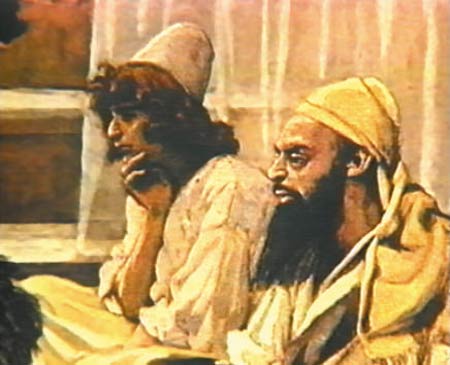 |
The verses speak of two young men entering the dungeon together with Prophet Yusuf (as). These two can be seen in the picture above. |
The Qur'an informs us that two other young men were thrown into the dungeon along with Prophet Yusuf (as), and that they asked him to interpret their dreams:
Two servants entered prison along with him. One said, "I dreamt that I was pressing grapes." The other said, "I dreamt I carried bread upon my head and birds were eating it. Tell us the true meaning of these dreams. We see that you're one of the righteous." (Surah Yusuf: 36)
It will be recalled that Allah had taught Prophet Yusuf (as) to interpret people's words. That was why his cellmates asked him to interpret their dreams. One point is worthy of note here: How did they know that Prophet Yusuf (as) possessed such knowledge and wisdom?
The statement in the next part of the verse shows the answer to this question; the others in the dungeon said that they saw him as "one of the righteous." This shows that throughout his time in prison Prophet Yusuf (as) behaved like a true believer, which influenced the people around him. It appears that Prophet Yusuf's behaviour, nature and external appearance were all of a kind to inspire confidence in others. In fact, even someone's facial expression can make people around sense that he is a true believer. When Allah refers to believers in the Qur'an, He speaks:quot;... Their mark is on their faces, the traces of prostration..."(Surat al-Fath: 29)
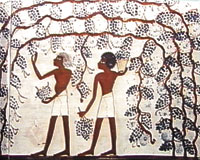 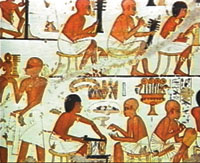 |
These ancient Egyptian pictures describe the dreams of the two young men who were imprisoned with Prophet Yusuf (as). The top picture shows the young man preparing wine. Underneath can be seen the bird eating the bread the young man was carrying on his head. |
The marks from prostration referred to here are probably not restricted to the physical marks which result from long hours of prayer, but also include "the light of faith" that illuminates a person's face (Allah knows best, of course).
The uprightness displayed by Prophet Yusuf (as) in the dungeon shows us an important quality of believers; the believer displays the same impressive integrity wherever he may be. That is because believers live to earn the good pleasure of Allah, and Allah is everywhere in His knowledge. Allah is always with the believer, whether in prison, at home, walking in the street, writing at his desk, eating or watching the television. He enfolds the believer and knows everything he says or that passes through his mind. That is why a believer's preference for good behaviour and morals does not change according to his situation. Believers constantly strive to exhibit a consistently high standard of morality and conscience.
That was why Prophet Yusuf's cellmates trusted him (as), saw that he was a good person and sought his advice. Prophet Yusuf (as) began to speak after they had made their request. As will be seen from the verses below, however, he trod a very intelligent path in doing so. He directed the flow of talk in the direction he considered most appropriate, and dealt with what he regarded as the more important and pressing issues before moving on to the subjects that most interested them:
He said, "No meal to feed you will arrive before I have informed you what they mean. That is part of what my Lord taught me. For I have left the religion of a people who clearly have no faith in Allah and disbelieve about the world to come. I hold fast to the creed of my forebears Ibrahim and Ishaq and Ya'qub. We don't associate anything with Allah. And that is how Allah has favoured us and all mankind, but most do not give thanks. My fellow-prisoners, are many lords better, or Allah, the only One, the Conqueror? What you serve apart from Him are only names which you and your forefathers have made up. There is no mandate for them from Allah. Allah alone is qualified to judge. His order is to worship none but Him. That is in truth the straight and upright religion, but most of mankind simply do not know. (Surah Yusuf: 37-40)
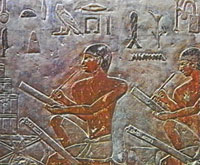 |
Stone carvings depicting the studies and books on the science of dream interpretation in Egypt and Mesopotamia during that period. |
As can be seen, Prophet Yusuf (as) told them of the oneness of Allah and the evils of polytheism. He explained the twisted nature of the system of ignorance in which they lived and recommended that they serve Allah alone.
While he spoke, he also gave examples of past prophets, recalling how they had all been part of the same Divine religion.
He also asked questions to encourage the people he was speaking with to think. For example, he asked, "... are many lords better, or Allah, the only One, the Conqueror?" at the same time recalling Allah's name as the Conqueror. Thus he tried both to get them to think and to have awe of the glory of Allah.
He then recalled the idols that his listeners worshipped, saying that these were nothing but superstitions, false idols inherited from the time of their ancestors that lacked any evidence of authenticity. He explained that it was a sin to worship anything other than Allah , and that most people were unaware of this, and then invited them to the true path.
The steps taken by Prophet Yusuf (as) illustrate the kind of sound approach that should be employed when explaining Islam to people. Recognizing the opportunity that presented itself in their desire to broach the subject, he first explained what he wished to speak about in some detail. Having done this, he then moved on to answering their question regarding the interpretation of their dreams:
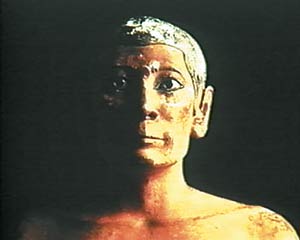 |
A bust of one of Prophet Yusuf's cellmates. |
"My fellow-captives, one of you will serve his lord with wine, the other of you will be crucified and birds will eat his head. The thing you asked about is foreordained." He said to the one of them he knew was saved, "Please mention me when you are with your lord," but satan made him forget to remind his lord, and so he stayed in prison for several years. (Surah Yusuf: 41-42)
Careful attention to the second verse shows that Prophet Yusuf (as) actually behaved rather intelligently. After speaking about the interpretation of their dreams, he told the one of his two cellmates who would be saved to remind his lord about him. This was a very shrewd strategy intended to secure his release from the dungeon. Yet Prophet Yusuf (as) was also aware that there were limits to what he might achieve and that he would only leave the prison when Allah so willed.
In fact, as can be seen in the last part of the verses quoted above, satan caused that individual to forget Prophet Yusuf (as), who spent many long years incarcerated. However, the prophet also knew that this was the most advantageous outcome. This was actually a test calling for patience, and there is no doubt that spending long years in prison and even being forgotten would be very hard for most people. Yet Prophet Yusuf (as) here confirms the superiority of his moral values and faith, greeting everything that happened to him with submission to the will of Allah.
 |
One day, the ruler wished to have one of his dreams interpreted. He sought out the most reputable seers and wise men in the country. The incident is depicted in the picture above.. |
As related in the Qur'an, Prophet Yusuf (as) spent long years in the dungeon. One day, however, the ruler wished to have one of his dreams interpreted. The best-known seers and wise men in the country were summoned for the purpose. Yet they all said that the ruler's dream was very confused and were unable to interpret it. A short while after, however, one of Prophet Yusuf's former cellmates remembered him:
The King declared, "I dreamt of seven fat cows which seven thin ones ate and seven green ears of wheat and some others which were dry. O counsellors! Explain my dream to me if you are those who can interpret visions!" They said, "A jumbled mass of mixed-up dreams! We do not know the meaning of such things." The one of them who had been saved then said, remembering after a period, "I will tell you what it signifies, so send me out." (Surah Yusuf: 43-45)
 | 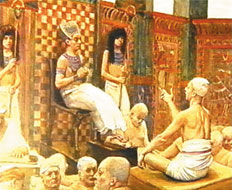 |
When the most famous seers and wise men in the country failed to interpret the ruler's dream, Prophet Yusuf's cellmate who had been released from prison remembered Yusuf (as) and suggested his lord visit the prison to meet him. This is depicted in the relief above and the painting below. | |
It appears that events unfolded in a totally unexpected way and that Prophet Yusuf (as), who had been forgotten in the dungeon for so long, had finally been remembered. It was actually written in Prophet Yusuf's destiny that he would only be remembered after so many years had gone by, which is why events took the course they did. It was Allah Who sent the ruler his apparently confused dream, inspired in him the desire to have it explained to him, did not allow anyone to interpret it satisfactorily, and caused the former prisoner to remember Prophet Yusuf (as). Allah had determined all these things in advance. The Qur'an goes on to describe how events unfolded:
"O truthful Yusuf, tell us of seven fat cows which seven thin ones ate and seven green ears of wheat and some others which were dry so that I can return to them and let them know." (Surah Yusuf: 46)
The way his cellmate addressed Prophet Yusuf (as) is of particular interest, "O truthful Yusuf…" We can see from this expression that people could easily perceive the uprightness and pleasing manner of the true believer which characterised Prophet Yusuf (as). Like every prophet, Prophet Yusuf's behaviour expressed his own certainty and inspired confidence in those who encountered him. His former cellmate was aware of his capacities, and approached him seeing that he was truthful and trustworthy. When they met, he asked for an interpretation of the ruler's dream. Prophet Yusuf (as) provided an interpretation in these terms:
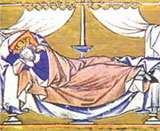 | 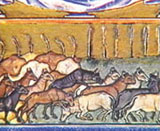 |
The King declared, "I dreamt of seven fat cows which seven thin ones ate and seven green ears of wheat and some others which were dry..."(Surah Yusuf: 43) | |
He said, "Sow for seven years in the normal way and leave that which you harvest in the ear except for a small amount from which you eat. Then after that seven hard years will arrive in which you can eat from what you set aside for them, except for a little which you store. Then after that another year will come in which the people will be helped by rain in plenty and when they once more will press." (Surah Yusuf: 47-49)
When the ruler learned how Prophet Yusuf (as) had interpreted his dream he called him into his presence. When the ruler's messenger came to Prophet Yusuf (as), the prophet employed a very intelligent strategy. In order for it to emerge that he had been thrown into prison and slandered although he was entirely guiltless, and in order that the truth should come out, instead of obeying the summons at once, he sent the messenger back to the ruler with a series of questions that would cause the matter to be looked into again. He enquired after the women who had cut their hands, who were witnesses to Prophet Yusuf's innocence and to Aziz's wife's lack of chastity. They were all first-degree witnesses, although the kind of environment in which they could give evidence had not existed previously. For that reason, Prophet Yusuf (as) used this opportunity most wisely. The incident is described as follows:
The King said, "Bring him to me straight away!" But when the envoy came to him, he [Yusuf] said, "Go back to your master and enquire of him what happened about the women who cut their hands. My Lord has knowledge of their cunning guile." (Surah Yusuf: 50)
In response to Prophet Yusuf's question, the ruler gathered the women together and asked for the truth of the matter:
He said, "What was this past affair of yours when you solicited Yusuf?" Then they said "Allah forbid! We know no bad of him." The governor's wife then said, "The truth has now emerged. Indeed I tried to seduce him then and he has simply told the honest truth." (Surah Yusuf: 51)
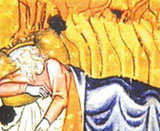 | 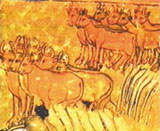 |
The interpretation of the Egyptian ruler's dream by Prophet Yusuf (as) as depicted in various Christian sources. | |
After so many years the truth finally emerged. It was realised that the women had set a trap for Yusuf (as) and that he had acted with virtue in the face of the woman's ugly proposition. However, the years he had spent in prison, even though his innocence was quite obvious, were by no means a loss or misfortune. Allah had already planned every moment he experienced, and that plan contained great compassion and good. Being in the dungeon had served as a vehicle for Yusuf's spiritual education (as) and in order for him to grow in depth and maturity. He drew close to Allah by means of his pleasing attitude. All troubles and difficulties in this world are recompensed in the hereafter. Allah promises those of his servants who are patient in the face of difficulties in this world, those who submit and are grateful to Him, even in the most difficult conditions, a pleasing life in the hereafter and His good pleasure.
Furthermore, the time Prophet Yusuf (as) spent in the dungeon was also a vehicle for another auspicious matter, since Allah had so ordered the political environment in Egypt that it became a means whereby he was able to come to power.
When we look at the next episode in the story, we see that after the women confessed the truth Prophet Yusuf (as) said to the intermediary:
"In this way he [the vizier] may know at last that I did not dishonour him behind his back and that Allah most surely does not guide the deviousness of the dishonourable. I do not say my self was free from blame. The self indeed commands to evil acts–except for those my Lord has mercy on. My Lord, He is Forgiving, Merciful." (Surah Yusuf: 52-53)
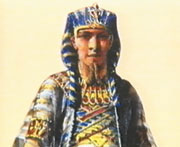 | 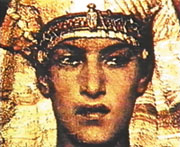 |
Representations of the Egyptian ruler of the time. | |
The striking point here is that Prophet Yusuf (as) again reminded those around him of Allah. He said that Allah never allows the treacherous plans of those who set cunning traps to succeed, and that He eventually causes the truth to surface. This is an important point, because the slanders against Prophet Yusuf (as) came to light by Allah's permission. The ruler and the people learned the truth at the moment and in the manner Allah desired. The destiny Allah determined went into effect and gave rise to the best and most favourable scenario.
Yet what Prophet Yusuf (as) says in the above verses is also most important. Despite the truth being out in the open, his being the victim of an obvious slander, his spending so many years in prison and being a servant raised to the status of prophet by Allah, Prophet Yusuf (as) did not attempt to deny the vulnerability of his own lower self. He also revealed another most important truth here; "The self indeed commands to evil acts – except for those my Lord has mercy on…" This is something that believers need to bear in mind at every moment of their lives. That is because every human being has earthly desires, and all people are tested at every moment throughout their lives. One's desires may sometimes clash with one's conscience, and a person will listen to the one or the other. Believers strive with the very greatest determination to heed the voice of their consciences which call them to what is pleasing to Allah, while other people live at the mercy of their desires.
If a believer loses sight of his task and succumbs to his desires he must repent and be more on his guard against the evils of those desires. That is because, as Allah has informed us in the Qur'an by means of the words of Prophet Yusuf (as), earthly desires always command one to commit evil acts.